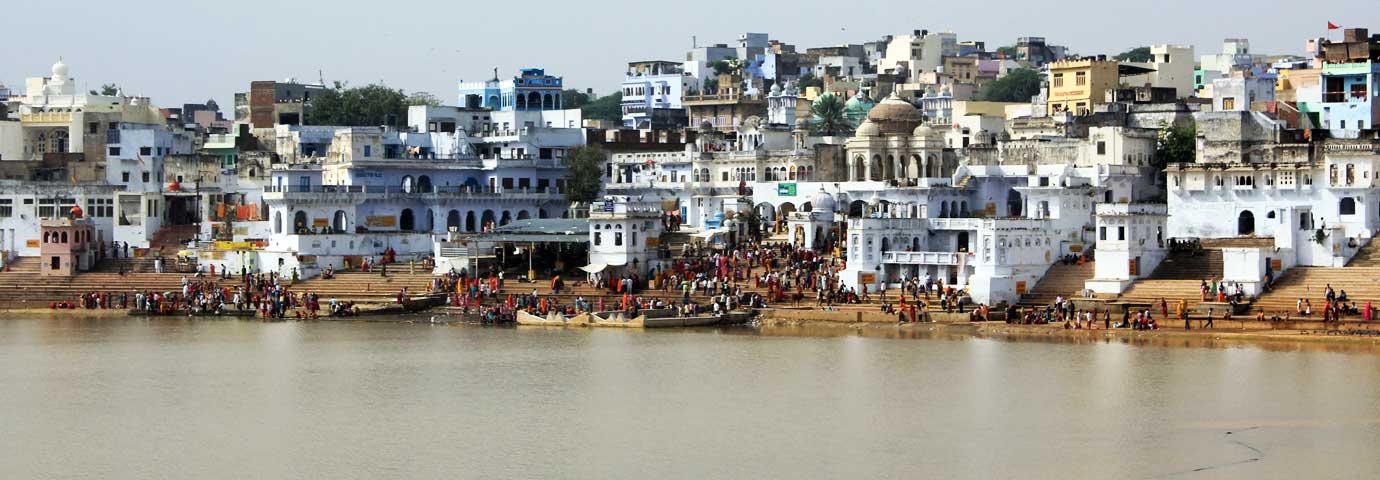Located in the small town of Pushkar in the Ajmer district of Rajasthan, The Pushkar Lake is one of the most prominent spots of pilgrimage as well as the site of the world famous Pushkar Fair. Encircled by numerous temples and ghats (bathing spots), the lake draws thousands upon thousands devotees every year to its threshold, to gain spiritual distinction and attain salvation by taking a dip in its holy waters.
As the Kartik (Oct-Nov) month descends, the site becomes the focus of soulful devotion and pilgrimage as auspiciousness of this time is highly emphasized in Hindu sacred texts. At the same time, Pushkar Fair wonderfully exhibits the vibrancy of Rajasthan with exotic colors, dishes, dance, cattle fair and numerous entertaining contests and competitions. With amazing spiritual atmosphere, Pushkar Lake remains the site of timeless reverence and spirit.
History
The lake at Pushkar has an incredible historical and religious significance. It finds mention in several sacred Hindu Texts and sources and is primarily associated with Lord Brahma, who is considered as the creator out of the Trinity of Gods-Brahma, Vishnu, and Mahesh. According to most versions of the legend associated with the lake, when Lord Brahma killed demon Vajranabha, three petals of His divine lotus fell at three parts, creating springs in their place, known as Pushkar. Later on, Brahma also performed a yagna at the place. However, at the end of this ritual, he got cursed by his first wife that, he will be worshipped at this spot only.
The archeological dating of the lake measures that lake existed even in the 4th century BC. In later periods it was referred to in many sources- from the inscriptions at Sanchi to records of Chinese Traveler Fa Xian. Over the period of time many Rajput rulers and local chiefs of Ajmer tried to restore the glory of Pushkar. The lake lost significance only during the brief period of Mughal rule except during the reign of Akbar.
Significance of Pushkar Lake
Pushkar Lake is one of the most holy sites for Hindus and the place is accessed mostly for religious purposes only. The lake is surrounded by around 500 temples and 52 Ghats with different religious significance. People from all across the country and from all walks of life come here to take a dip in its sacred waters. However, taking bath in Pushkar during Kartik Poornima (Full Moon Day), in the month of Kartik (October-November) assumes special importance as it is considered highly auspicious. Also circumambulating the lake along with Hanuman and Krishna Temple in the vicinity is also considered religiously favorable.
It is believed that taking bath in the Lake during Kartika washes all the sins and absolve the devotees of bodily ailments especially skin diseases. Ramayana and Mahabharata refer Pushkar Lake as Adi-Tirtha while the lake is also counted one amongst the supremely sacred Panch-Sarovar. The Lake has been marked as one of the ten most religious places in the world and one amongst the five top sacred places for Hindus in India. The site is also home to the world’s only Brahma Temple.
Pushkar Fair
The Pushkar fair is one of the central attractions at the lake and during this time there is huge inflow of pilgrims and tourists from all the four directions. Each year the fair starts at Prabhodini Ekadashi and ends at Kartik Poornima. This time is not only favorable for the devotees to gain spiritual merit by taking the holy dip in to the sacred waters of the lake, but also a great business opportunity for the locals when tourists arrive from far and wide to participate in the colorful events. The Pushkar fair is also Asia’s largest camel fair.
The Ghats at Pushkar Lake
The Ghats or lakeside embankments incorporating the descending stone steps are one of the most important parts of pilgrimage at Pushkar. Originally there were twelve Ghats at the Pushkar, but now their number has been increased to 52. Each of the Ghat at Pushkar hold their own individual significance since it is believed that waters of each Ghat have different curative properties.
The ambience and spiritual atmosphere at the ghats is amazing and offers a close understanding of Hindu beliefs and practices. Out of these 52 ghats, two of them have special significance. The Gau Ghat-where ashes of towering personalities like Mahatma Gandhi, Jawaharlal Nehru and Lal Bahadur Shashtri were immersed while at Brahma Ghat, it is believed that Lord Brahma himself worshipped and performed a yagna inviting all celestial beings across the Hindu pantheon.


